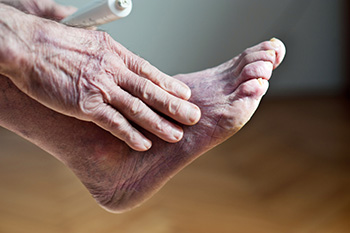Common Signs of Poor Foot Circulation
Tuesday, 26 March 2024 00:00
Effective circulation is essential for maintaining optimal foot health and overall well-being. Poor foot circulation, often overlooked, can lead to various discomforts and complications if left unaddressed. Common signs of inadequate circulation in the feet include persistent coldness or numbness, particularly in the toes and lower extremities. Individuals may also experience tingling sensations, known as paresthesia or pins and needles, indicative of reduced blood flow. Swelling, discoloration, and slow-healing wounds or ulcers on the feet are additional signs that circulation may be compromised. Cramping or muscle weakness in the legs and feet, especially during physical activity, can also signal poor circulation. In severe cases, individuals may develop peripheral artery disease, abbreviated PAD, which is a condition characterized by narrowed arteries that restrict blood flow to the extremities. If you are experiencing poor foot circulation, it is suggested that you are under the care of a podiatrist who can help you to manage this condition.
While poor circulation itself isn’t a condition; it is a symptom of another underlying health condition you may have. If you have any concerns with poor circulation in your feet contact Dr. Mark Spier of Maryland. Our doctor will treat your foot and ankle needs.
Poor Circulation in the Feet
Peripheral artery disease (PAD) can potentially lead to poor circulation in the lower extremities. PAD is a condition that causes the blood vessels and arteries to narrow. In a linked condition called atherosclerosis, the arteries stiffen up due to a buildup of plaque in the arteries and blood vessels. These two conditions can cause a decrease in the amount of blood that flows to your extremities, therefore resulting in pain.
Symptoms
Some of the most common symptoms of poor circulation are:
- Numbness
- Tingling
- Throbbing or stinging pain in limbs
- Pain
- Muscle Cramps
Treatment for poor circulation often depends on the underlying condition that causes it. Methods for treatment may include insulin for diabetes, special exercise programs, surgery for varicose veins, or compression socks for swollen legs.
As always, see a podiatrist as he or she will assist in finding a regimen that suits you. A podiatrist can also prescribe you any needed medication.
If you have any questions, please feel free to contact one of our offices located in Columbia and Reisterstown, MD . We offer the newest diagnostic and treatment technologies for all your foot care needs.









